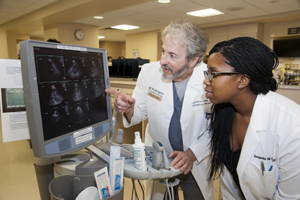A program to encourage and support women pursuing careers in information technology, and another to create a pipeline of outstanding minority and women candidates for School of Medicine faculty positions, are among the projects that received a funding boost from this year’s Diversity and Inclusion Grants program.
The Washington University in St. Louis Office of the Provost provides funding for the DIGS program. Since 2009, the program has awarded nearly $750,000 to faculty and staff for about three-dozen projects.
In all, the grants committee this year awarded $147,200 for eight projects. Grants are one-time awards and amounts vary, but are capped at $30,000 per project.
Barb Braun, director of Student Technology Services, is helping create the “SPIN-IT: Leadership Program for WUSTL Women in Information Technology (IT) Professions,” and received an $11,000 grant toward the effort.
She explained that the plan is for experienced women professionals to serve as mentors for up to 15 newer women IT employees at WUSTL this spring and summer — with an eye toward the newer employees in turn providing support for up to 15 students next fall.
The program plans to have a many-pronged approach, including individual mentoring, skills training, networking opportunities and a speakers series with both women from WUSTL and from outside business and nonprofit organizations.
“The realization that women are lacking in this career field and the ‘why’ is something that we can explore, so that at the end of the grant, we have recruited, retained, and rewarded women in a field that is traditionally seen as a male-only, male-led career area,” Braun says.
Meanwhile, at the School of Medicine, Archie Harmon, PhD, an instructor in the Department of Otolaryngology, received $30,000, the largest of this year’s awards, as project team leader for the “Faculty Reach-Out Program,” or F.R.O.P.
That initiative is a two-day series of workshops aimed at women and underrepresented minorities from around the country who demonstrate the potential to fill expected faculty appointments at the School of Medicine.
Participants attend sessions that offer guidance on topics such as obtaining positions and research grants and how to start strong on a tenure track. They also meet with current university faculty and tour research facilities to pique their interest in a career at WUSTL, Harmon says.
“I think of the F.R.O.P. as a ‘new faculty survival kit,’” Harmon says. “F.R.O.P. expands the applicant pool at the School of Medicine through early identification of outstanding women and underrepresented minority scholars before they accept their first tenure-track appointment.”

An example of a success story funded in part by last year’s Diversity Grants program is another medical school effort, a summer research program for students from Meharry Medical College in Nashville, Tenn.
Students were paired with a faculty mentor and received a stipend and on-campus housing for two months while performing cutting-edge research. (For further details on that project, see the previous Record article.)
Each year, an advisory committee determines which proposals will receive funding and focuses on those that deal with the work environment; attracting and keeping a diverse faculty pool; and staff and cultural competence.
This year, the committee received 27 grant applications. As the program explains, the focus on diversity can take many forms, from top-of-mind issues such as gender and race to categories such as disability, geography or sexual orientation.
“We received many innovative proposals,” says Adrienne D. Davis, JD, vice provost, William M. Van Cleve Professor of Law and co-chair of the Advisory Committee for Diversity and Inclusion Grants. “Providing funding for these projects helps encourage a more diverse university community through hands-on, practical support for faculty and staff members. We think of it as democratizing diversity – giving our faculty and staff the resources to make a more diverse and inclusive climate here at Washington University.”
The project team leaders of the rest of the 2012-13 Diversity and Inclusion Grants program winning proposals, amounts awarded, and project titles are:
Douglas M. Char, MD, emergency medicine program director, $12,000 for “Career Development Workshop Series for Faculty Diversity Scholars and Underrepresented Faculty at the School of Medicine.”
Rudolph Clay, head of outreach services and African and African-American studies at Washington University Libraries, $25,200 for “Recruiting a Diverse Library Workforce: Summer Internship Program in the Washington University Libraries.”
Judi McLean Parks, PhD, the Reuben C. and Anne Carpenter Taylor Professor of Organizational Behavior in the Olin Business School, $24,000 for “Early Career Professional Development Workshop for Traditionally Underrepresented Minorities in Business.”
Nichole R. Mercier, PhD, a business development director in the Office of the Vice Chancellor for Research’s Office of Technology Management, $20,000 for “Women in Innovation & Entrepreneurship.”
Mark Rollins, PhD, chair of the Performing Arts Department in Arts & Sciences, $15,000 for “Delmar Divide: A Campus Conversation.”
Rochelle Smith, director of the Office of Diversity, Summer Programs and Community Outreach in the Division of Biology & Biomedical Sciences, $10,000 for “The Testimonies Project: Using the Power of Success Stories to Encourage and Empower Women at Washington University and Beyond.”